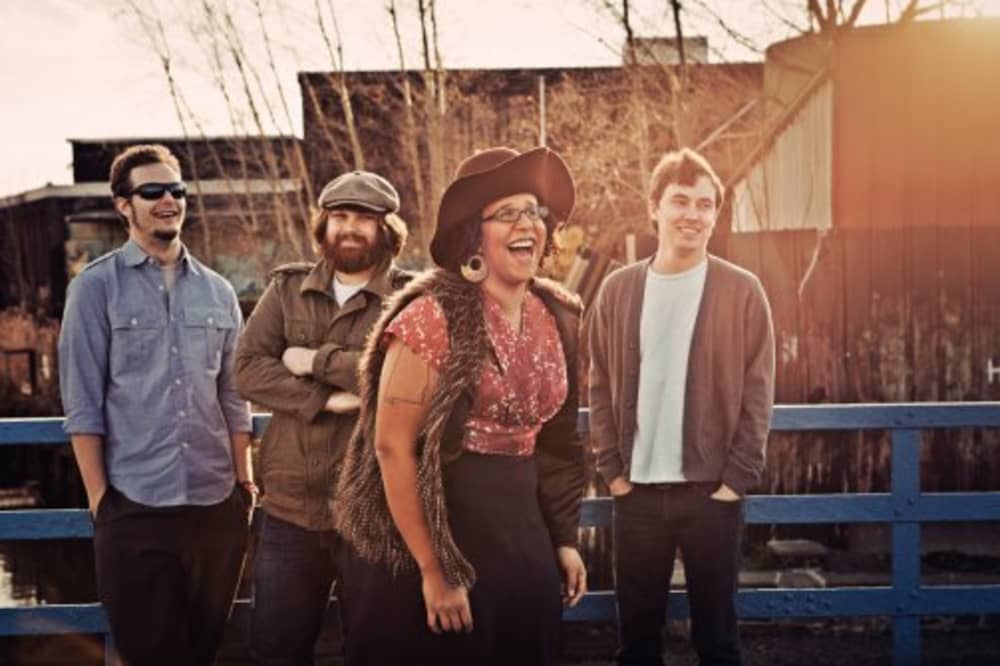Listen up for good
New Austin-based music organization Bedrock takes fundraising digital
 Alabama ShakesPhoto courtesy of Austin Rodeo
Alabama ShakesPhoto courtesy of Austin Rodeo Explosions in the Sky were on the first compilation album released in October2011.Photo by Nick Simonite
Explosions in the Sky were on the first compilation album released in October2011.Photo by Nick Simonite Los Lonely Boys are of the many artists that work with fundraising with Bedrock.Photo courtesy of Los Lonely Boys
Los Lonely Boys are of the many artists that work with fundraising with Bedrock.Photo courtesy of Los Lonely Boys Bedrock founders Lisa Hickey and Jan Mirkin-Earley.
Bedrock founders Lisa Hickey and Jan Mirkin-Earley. The Bedrock Volum 1 CD.
The Bedrock Volum 1 CD.
Back in the day, if a kid wanted to fundraise, he or she had to do it the hard way. Basically, that equated to knocking on every door in the neighborhood until some poor soul finally agreed to purchase whatever goods were up for grabs: an overpriced bar of chocolate, a tin of stale cheddar popcorn or a roll of gaudy wrapping paper. The list goes on.
Times have changed and so have school fundraising tactics. Undoubtedly, kids are still going to be peddling chocolate, but with the inception of new fundraising organizations such as Bedrock Music, they don’t necessarily have to.
The premise behind Bedrock is simple and ingenious: parents and students use an online campaign manager to sell digital music compilations, thus eliminating inventory and maximizing profits. Proceeds from all sales not only benefit the school but also the participating artists and musicians, making it a win-win for all parties involved.
The more money a student raises, the more points they rack up, which can then be redeemed for cool prizes such as guitars, music festival passes, jewelry and even scholarships.
The organization is gearing up to release its second compilation featuring artists such as John Legend and Gotye this month. Lisa Hickey, festival marketing director at C3 Presents and co-founder of Bedrock, sat down with us to discuss the organization’s conception and its growth.
CultureMap: What’s the story behind Bedrock? How was the idea conceived?
Lisa Hickey: It was around the end of 2009 and it was just sort of a perfect storm of things happening in our lives at the time. Jan [Mirkin-Earley] was running a record label called Justice Records. She was looking for another project and, at the time, I had been invited to participate in a Clear Channel community advisory board. We talked about the biggest issues facing our community and it basically seemed like it all stemmed back to education [which] goes on to equal the quality of life. It’s the trickle-down effect.
I started to learn more about the state of education in Travis County and Texas and my natural reaction was to think "how can we, in the music business, help?" I started kicking [the idea] around with Jan and thought "what about selling music to raise money for schools?" We realized we couldn’t do CDs. It seemed like too much inventory. So we said it’s got to be 100 percent digital.
And Mellie [Price], I’d worked with at Frontgate Tickets. Jan had read about some of the investment stuff that Mellie had been doing and said "we need to call her." So we did and she loved the idea and that’s when we decided to go for it.
CM: Compared to “old-fashioned” school fundraisers, how do Bedrock’s fundraising profits stack up?
LH: It’s actually a lot higher. I read the average is 40 percent back to the schools. We recently went to a PTA conference in the summer and we heard that number — 40 percent — is very high. I think a lot of them are getting a return of 10 or 15 percent.
The benefits of Bedrock are that the schools don’t have to invest anything in product so there’s no inventory to manage. It’s no risk and we offer a much higher return. And that it’s all online so the fulfillment is easy and you don’t have to go door-to-door, which probably isn’t as safe as it used to be.
CM: Let’s talk about the actual product. The first album was comprised of all Austin artists — Grupo Fantasma, Explosions In the Sky. The second album, which features John Legend, Gotye, and Alabama Shakes, isn’t. How did you make this decision?
LH: I think people liked the idea of supporting Austin music, but when you go to somebody in the PTA at an elementary school somewhere, they probably don’t know most of the people on the record.
So we thought the next evolution of that would be to not only get more recognizable artists for people that listen to them — more mainstream music — but also so we could work with people outside of Austin and expand. It was just leveraging relationships and making a couple of phone calls to managers I’ve met through my job.
CM: There was over a year between the first two compilations. How often do you hope to release these albums?
LH: The first one, just being Austin bands, we were able to get knocked out pretty quickly. The second one, with different artists and labels, took a lot longer. We would need to start the process a lot sooner. The goal, at this point, once we took that next step, is to do a couple a year.
CM: As the frequency of these album releases increases and as Bedrock expands, have you considered releasing different genre compilations?
LH: Absolutely. That would be the next step, being able to sell multiple albums on our site; to have a catalog built up. We’d like to get where we can crank out several genres of music a year, so you’ve got urban, country, indie, soul — all to better serve the different demos and music tastes.
CM: That sounds like a great idea. How successful has this fundraising scheme been thus far?
LH: We spent basically a year of the first album going directly to schools, administrators, principals and teachers. We had to learn some things like schools are limited to two on-campus fundraisers per year. Other than that, the PTAs can do as much fundraising as they want — they’re a separate 501(c)(3) — and that took us a few months to figure out.
Our original model was students fundraising and selling and, again, what we learned is that they don’t do anything unless their parents tell them to do it or do it for them. We had to adjust our strategy to make it so fund-raisers, meaning not just students, could sign up on the website and create accounts. So, again, just a big thing that we learned is that we were targeting students to do the work and now we want to make it easier so that parents [can be involved].
CM: Sounds like a lot of trial by error, which is pretty normal for start-ups.
LH: Definitely. Education is tricky. When it comes to schools and districts — every district operates differently, too. There was a lot that we had to learn and figure out. One thing is for sure: Everyone that we talk to about Bedrock loves the idea; they want to get involved and support it. All the artists really love the idea; they think it’s interesting. There’s definitely something there.
Now that we can work with schools anywhere, any age or grade, I think that opens up opportunities and possibilities for the next one coming out in January, which comes out right before the Grammies. We have two Grammy-nominated artists: Gotye and Alabama Shakes.
